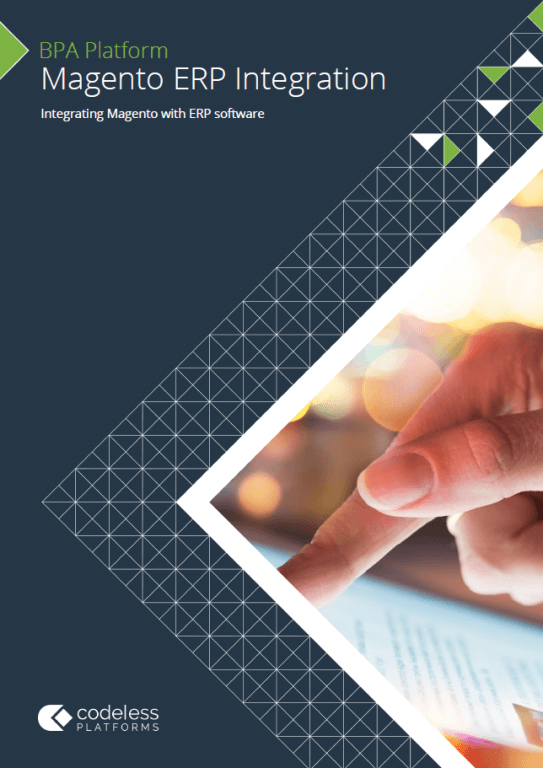- Magento Integration with ERP
- What is Magento eCommerce?
- What is Magento B2B eCommerce Platform?
- Is Magento an ERP?
- What is the role of ERP systems in eBusiness?
- Mapping eCommerce Processes
- Best ERP for Magento
- How does eCommerce ERP integrate?
- What is Magento Integration?
- The benefits of Magento ERP integration
- Magento Integration Services
- Frequently Asked Questions
Magento Integration with ERP
Due to the recent rise in online shopping, Adobe Commerce, formerly Magento integration with ERP has become an essential business requirement. The COVID-19 pandemic has accelerated the demand for businesses to have an eCommerce presence. Organisations, in a variety of industries, have had to start selling products or services online, whereas existing eCommerce businesses have experienced rapid sales growth.
The quick transition has resulted in businesses being placed under added pressure, to not only retain its employees and protect current and future revenue, but to meet the growing demands placed on them from consumers.
An eCommerce trends survey conducted by tech company SearchNode found that 90% of eCommerce businesses interviewed had seen their online sales revenue increase during the initial lockdown, with 50% of the participants claiming revenue increased by more than 100%.
Buying behavioural patterns have shifted and expectations are higher than ever. This means that companies selling online are processing more orders, uploading new and existing product lines, and fulfilling more packages in the warehouse, ready for shipping, with limited resource.
Unfortunately, through no fault of their own some organisations have furloughed employees that may be included in the end-to-end eCommerce process, yet are still expected to fulfil sales orders quickly, efficiently and without error.
In the same survey, SearchNode found that due to Covid-19, company strategy has shifted with 45% of organisations now focusing on key areas of digital transformation and investing in new eCommerce software. Whether you are specialising in a B2B or B2C environment, digital transformation through integrating your Magento eCommerce platform with your ERP system will provide you with the tools you need to meet these demands. eCommerce integration will help you to process more orders and increase company output, quickly, efficiently and without error.
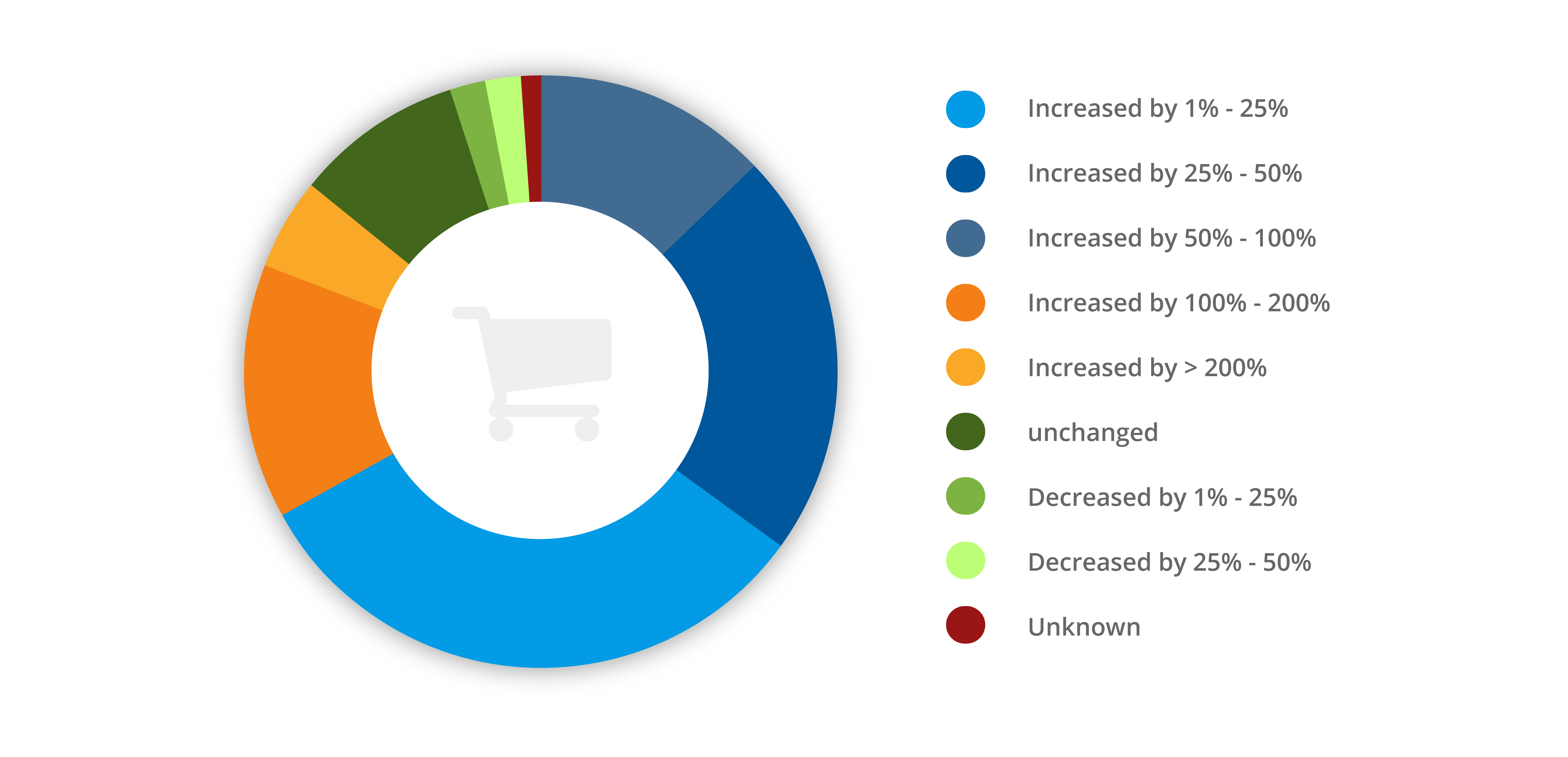
Source: SearchNode – eCommerce revenue increase, compared to pre-COVID restrictions
The following article will help you to identify the role of eCommerce and ERP within your organisation and highlight the key areas where Magento integration with ERP will provide you with a competitive advantage. It will also help you to identify your eCommerce process flow and how automation can improve the flow of eCommerce data. An additional eCommerce process flow workbook is available for you to use as a starting point to model your own processes and outlines an automated eCommerce process flow. This resource can be downloaded below.
Download eCommerce Process Workbook
What is Magento eCommerce?
Magento (an Adobe company) is a market leading eCommerce platform which provides eCommerce merchants with a solution to sell their products online. Magento is built on a PHP framework, whilst predominately using MySQL for database management. A Magento platform can be deployed as either on-premises or as a platform as a service (PaaS).
Magento users can customise the look and feel and user experience of their online shopping presence whilst increasing sales opportunities by reaching a wider audience. By using an eCommerce platform, such as Magento, existing and new customers can access your products and services 24/7, 365 days a year.
Magento provides the opportunity for organisations of all sizes with the opportunity to sell online. Small businesses with only a few products or organisations with thousands of products can easily scale business operations with custom functionality. It’s not only the aesthetic customisation of the store itself that can be adapted but the ability to integrate a Magento platform with other business systems, such as ERP, CRM, email marketing and shipping systems, that can help improve operational efficiency.
Quick Magento Overview
- Built upon a PHP framework
- MySQL for database management
- On-premises or PaaS options available
- Customise the look and feel of your eCommerce store
- Ability to integrate ERP into a Magento platform
What is Magento B2B eCommerce Platform?
In addition to Magento being widely available for B2C organisations, the Magento B2B eCommerce platform is available to businesses specialising in a B2B environment, such as manufacturers, wholesalers and distributors. Magento Commerce for B2B provides the functionality a B2B organisation thrives upon, such as streamlining RFQs, improving customer quoting and price negotiations, purchasing limits, credit limits and thresholds and order approval workflow.
Magento B2B Features
Magento B2B eCommerce increases the functionality of Magento commerce for retail by including the following B2B features:
- Request for Proposal (RFQ)
- Order, quote and invoice tracking
- Credit limits
- Purchasing limits and thresholds
- Customer specific payment options
- Automated order approvals
- Self-service tools
“Due to Covid-19, company strategy has shifted with 45% of organisations now focusing on digital transformation and investing in new eCommerce software.”
Is Magento an ERP?
Although Magento is a solid eCommerce platform that can hold stock, pricing, customer information and can manage a range of business processes, Magento is not an ERP system and cannot fulfil all the requirements that a business needs. An ERP system combines the key modules, operations and any missing functionality of your Magento store to provide an integrated eCommerce solution. You may need to look at investing in an ERP system if you are seeing any of the following pain points:
- Increase in order volumes and manual data entry
- Increased delays in order processing and fulfilment
- Dealing with multiple suppliers and B2B relationships
- Data entry errors, e.g. wrong shipping address, product errors and wrong category listings
- Reduced employee productivity due to repetitive data entry
- High volume of products and inventory
What is the role of ERP systems in eBusiness?
The role of ERP systems in eBusiness is to help your business increase productivity, retain customers and drive company revenue. ERP stands for Enterprise Resource Planning and supports multiple business functions to streamline day to day operations and processes by integrating the main components into the ‘complete’ business system.
Key modules most likely to be found within most ERP systems include accounting, order management, inventory, procurement, project management and, in some instances, CRM (customer relationship management). These modules and functions are integrated into one system to streamline and improve the management and visibility of information in day-to-day business processes to ensure data consistency across the business. In turn, this reduces operational costs by improving productivity, aids decision making and drives company revenue.
The role of ERP in eCommerce is an important one. There are a significant number of eCommerce costs that can slowly eat away at the profitability of increasing sales numbers. These hidden costs of eCommerce can predominantly be found within order processing and inventory management. The complete order management process is a vital, yet often costly activity. At the top level of your order management process, an order is placed within your Magento platform, manually processed and entered into your ERP software, and then passed to the warehouse for picking and fulfilment.
This is where ERP in eCommerce plays a key role, with the following areas being frequently called upon to work efficiently, without error:
- Customer: new, existing and guest accounts
- Item and stock: description, images, pricing, product details etc.
- Order: customer details, order value, products etc.
- Pricing: price changes and updates
- Accounting: process payments, place customer on credit hold, bank reconciliation, purchase orders etc.
- Shipment: shipping addresses, allocating products in the warehouse for fulfilment, pick lists, parcel tracking etc.
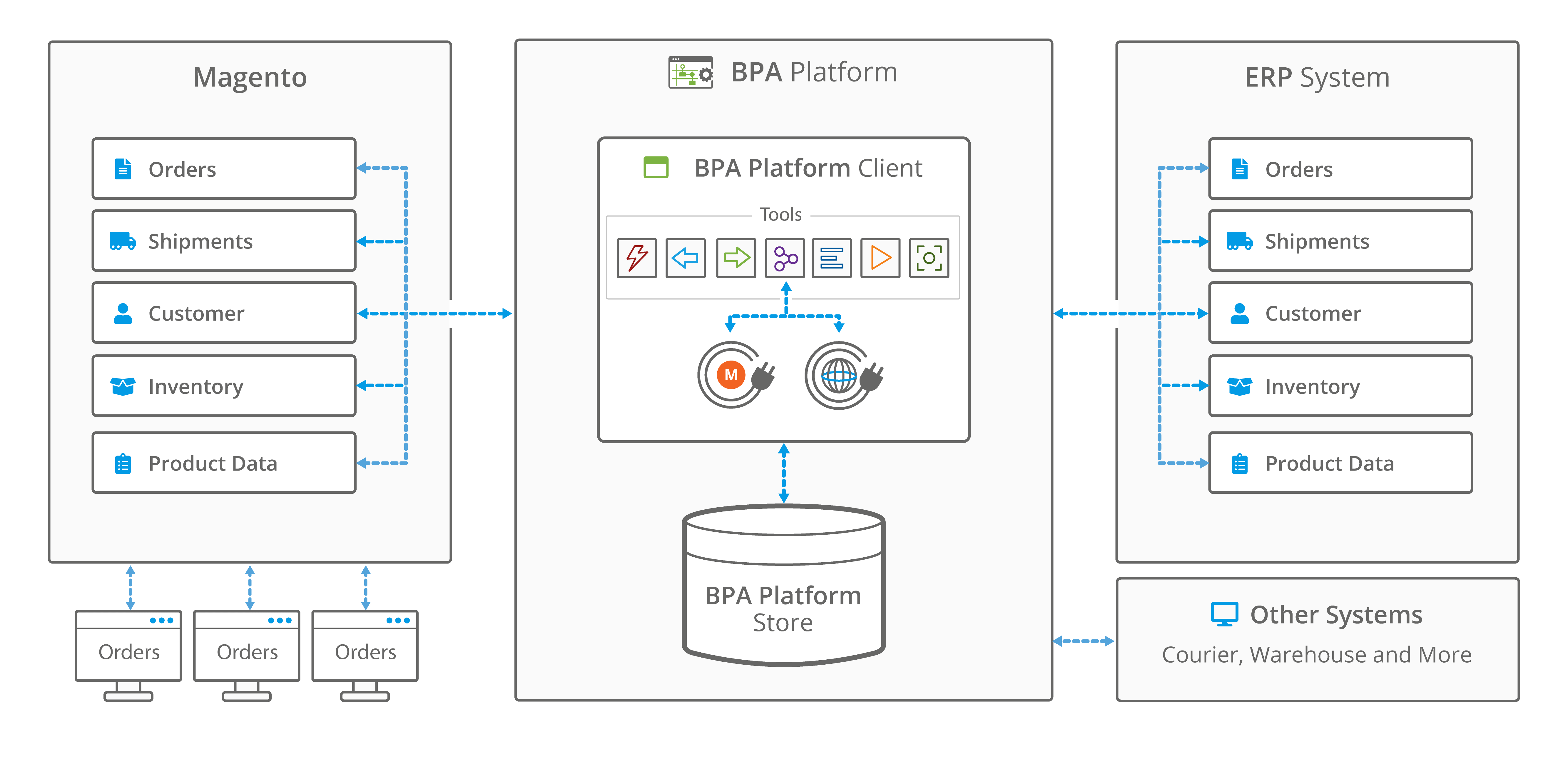
Example: Common Magento ERP integration process flow using BPA Platform
The ERP and eCommerce touchpoints mentioned above provide a low-level indication of the role of ERP systems in eBusiness. Many of these processes involve multiple departments and employees who need to manually update bi-directional data flows and monitor multiple systems for data changes, e.g. stock re-order points. This increases the risk of data entry errors, miscommunication, orders placed without sufficient stock levels, products placed in the wrong category and a decrease in customer satisfaction.
For many organisations, maintaining a manual eCommerce process with an increased volume of sales, higher demand in product lines, changing stock levels and processing payments is not a sustainable long-term business model. With the role of ERP systems in eBusiness becoming a vital element to business success, eCommerce professionals are turning to eCommerce ERP integration solutions to remove the hidden costs that quietly eat away at company revenue.
Mapping eCommerce Processes
Now that the role of ERP in eCommerce has been identified, start planning your eCommerce process flow to identify manual data processing tasks and highlight the key areas where an automated eCommerce process can be implemented. This will help you when discussing your Magento integration project with your chosen Magento integration service.
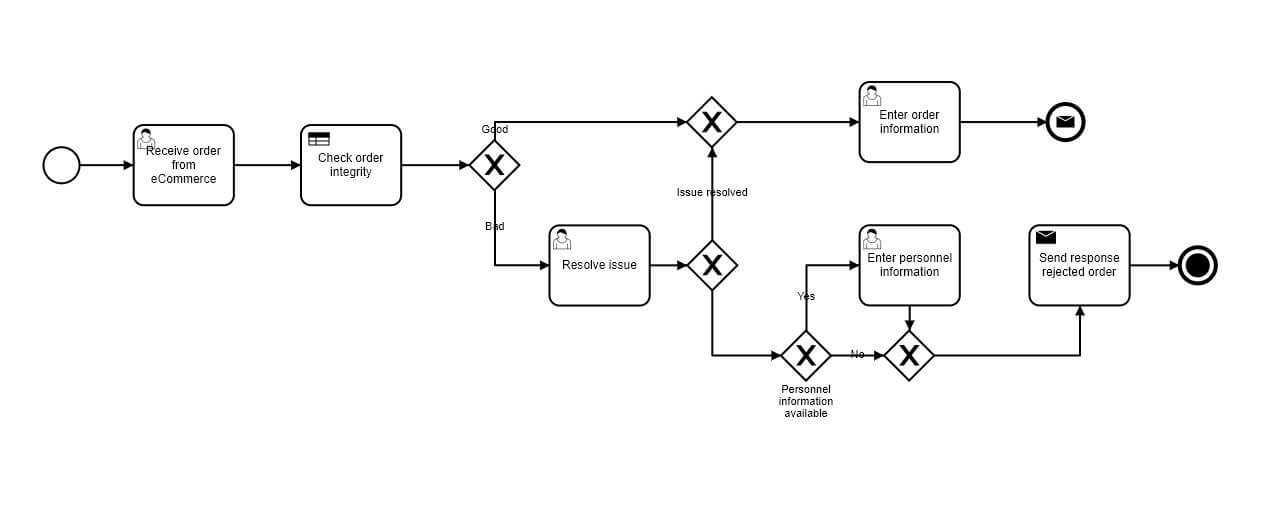
Image: eCommerce process example – receiving an order from an eCommerce platform.
Mapping your order management process can help you to identify where your hidden costs start and end. It will also help you to identify gaps within the eCommerce process and potentially highlight other areas within the business or process that can be automated to save the business time and money. Download the Mapping eCommerce Processes resource below and use it as a starting point to map your standard eCommerce process.
Download eCommerce Process Workbook
Best ERP for Magento
Since we have discussed the importance of ERP in eCommerce and the role that it plays, you may be thinking what is the best ERP for Magento? Or if you already have an ERP system in place, you might be looking to move ERP vendors, or just simply be keeping an eye on the options available.
ERP software is an important part of the eCommerce function and is a key mechanism for reducing costs and improving the consistency in the services you provide your customers. There is no right or wrong ERP system for Magento. The ERP system that you choose will be dependent on several factors, such as business size, functionality required, industry specialism, whether you’re B2B or B2C facing or the modules needed, e.g. manufacturing, procurement, and HR etc.
When choosing the right ERP system for your business, consider the following aspects:
- Are you a start-up business, SME or enterprise organisation? The size of your online store and business model will help to make a short list of relevant ERP solutions.
- Do you need B2C or B2B eCommerce functionality? Identifying the services you offer will highlight the functionality you need.
- Data and migration. Are you using an ERP system already? Where is your existing data held and can it be easily migrated into your new system?
- System integration. Can the ERP system easily integrate with Magento and other business systems and applications?
- Does the ERP system need to be on-premises or in the cloud?
Regardless of which ERP system you use or invest in, leading business process automation solutions integrate seamlessly with most ERP systems. Codeless Platforms works closely with ERP vendors, such as SAP, Microsoft, Sage, SYSPRO, Access and Epicor, and their business partners to ensure that its system integration tools are always compliant and up to date with the latest technological changes. *Some of the most common ERP systems that Codeless Platforms are asked to integrate with Magento include:
- SAP Business One
- SAP Business ByDesign
- Sage 200
- Sage 1000
- Sage X3
- Sage 300
- Microsoft Dynamics NAV
- Microsoft Dynamics AX
- Microsoft Dynamics 365 Business Central
- SYSPRO
- Epicor
- Exact
- Access Dimensions
*If your ERP system is not listed or you are looking for an ERP provider, please contact us.
In summary, the focus of your ERP system is to enhance the service you provide to your customers. It helps day to day operations to run more efficiently and can help you to reduce costs and improve the consistency in the services you provide. Your customers like to be updated on the progress of their order, when it has left the factory or warehouse, its delivery status and delivery date. Synchronising the data held in multiple databases enables you to provide a consistent and positive customer experience.
Download Magento Integration Brochure
How does eCommerce ERP integrate?
eCommerce ERP integration enables your business systems to ‘talk to each other’, pushing and pulling data, without employee intervention. An integrated eCommerce and ERP foundation ensures that your business processes become more manageable and streamlined, reducing the risk of human error and delays in order processing. The type of eCommerce ERP integration solution you choose will heavily depend on the number of orders and products you are manually processing between your Magento store and your ERP system.
When looking for suitable Magento integration service it’s worth looking at the bigger picture of business process automation. In many instances, system integration is not just achieving A to B connectivity, and it’s not just a ‘plugin’. It’s the full process of streamlining your day-to-day manual processes to run more efficiently and cost effectively, the bigger picture of future business goals, and the processes that sit within the extended order management process.
Think about the start of the eCommerce process of uploading and coordinating stock and what happens after an order is synchronised. Payments need to be processed and reconciled; stock levels need to be updated; new product lines categorised and added to business systems with descriptions; orders need to be picked and packed and processed for fulfilment; reports need to be collated and sent to relevant employees; and so on.
“Maintaining a manual eCommerce process with an increased volume of sales, higher demand in product lines, changing stock levels and processing payments is not a sustainable long-term business model.”
There may also be instances where you would like to integrate a supplier portal or improve communication and the purchasing process with them. All these points need to be considered and planned for when planning your eCommerce ERP integration project.
Depending on business size and requirements, businesses processing a smaller number of orders will most likely research the market for ‘point to point’ Magento connectors or a Magento integration plugin to synchronise sales orders. Organisations processing hundreds or thousands of orders a day, and those with complex business processes, will research the market for a more robust, flexible and customisable Magento integration solution that can automate additional processes, provide data transform capability and act off database triggers. These solutions can help a business to quickly adapt to changing business requirements as well as a variety of integration touchpoints and systems when required.
Download Magento Integration Brochure
Point-to-Point Magento Integration
Point-to-point Magento integration pushes order or product data from systems A to B. It can be a cost-effective way for a business to start its Magento ERP integration journey as point-to-point Magento connectors are built for a specific purpose in mind. Magento integration plugins can be deployed in minutes with minimal configuration. If a business is then looking to automate its order to fulfilment process and integrate its courier service, then that business needs to buy another connector suitable for that specific requirement to include system C, the courier provider, and so on.
Over time, as new point-to-point integration connectors are added, complications can occur. There could be 10 or 20 connectors from multiple software vendors, that all need to be managed and updated, reintegrated or purchased when an ERP or eCommerce platform is changed. Multiple point-to-point integrations can place an unnecessary strain on IT infrastructure for the larger organisation and increases the risk of security issues and incompatibility further down the line.
Point-to-point integration is perfect for the start-up eCommerce business due to its low overheads, and the volume of orders being processed. If you are currently processing a high volume of orders and/or products, have complex business processes, experiencing issues due to point-to-point integration, or are planning to grow or even looking to change your business systems, then a flexible Magento integration platform is more likely to appeal to you.
Custom in-house Magento integration
Depending on resources in the IT department, it’s possible for some organisations to develop eCommerce integrations through bespoke development. This approach can cause some issues further down the line. For example, any modifications needed to the integration will often require the same software development team to make the necessary changes.
Additionally, can the initial integration keep up to speed with the demands of changing business requirements and APIs without a process failing?
Despite some organisations venturing down the route of bespoke eCommerce integration, it can be costly, extremely complex and time-consuming, as well as potentially lack the ability to keep up to speed with the modern business environment. It may also not be able to perform all of the functionality that you would like it to e.g. the extended order management process.
Bespoke eCommerce integration has gradually been replaced through next generation integration tools. The flexibility of these drag and drop integration tools and business process automation solutions provide an opportunity to quickly and easily address integration requirements to reduce the time and costs of in-house development or contract developers.
Flexible, customisable Magento integration tools
Third-party integration solutions provide a cost-effective way for organisations to reduce the time and costs of bespoke development projects. These integration platforms provide the IT department with business process automation tools that can interact with practically any database source and automate any number of business processes without the need for any bespoke software coding.
For organisations that are processing a higher volume of sales and inventory, or are looking for a solution that reduces development times and can provide the basis for all system integration and process automation requirements, a flexible integration solution is more likely to appeal to them.
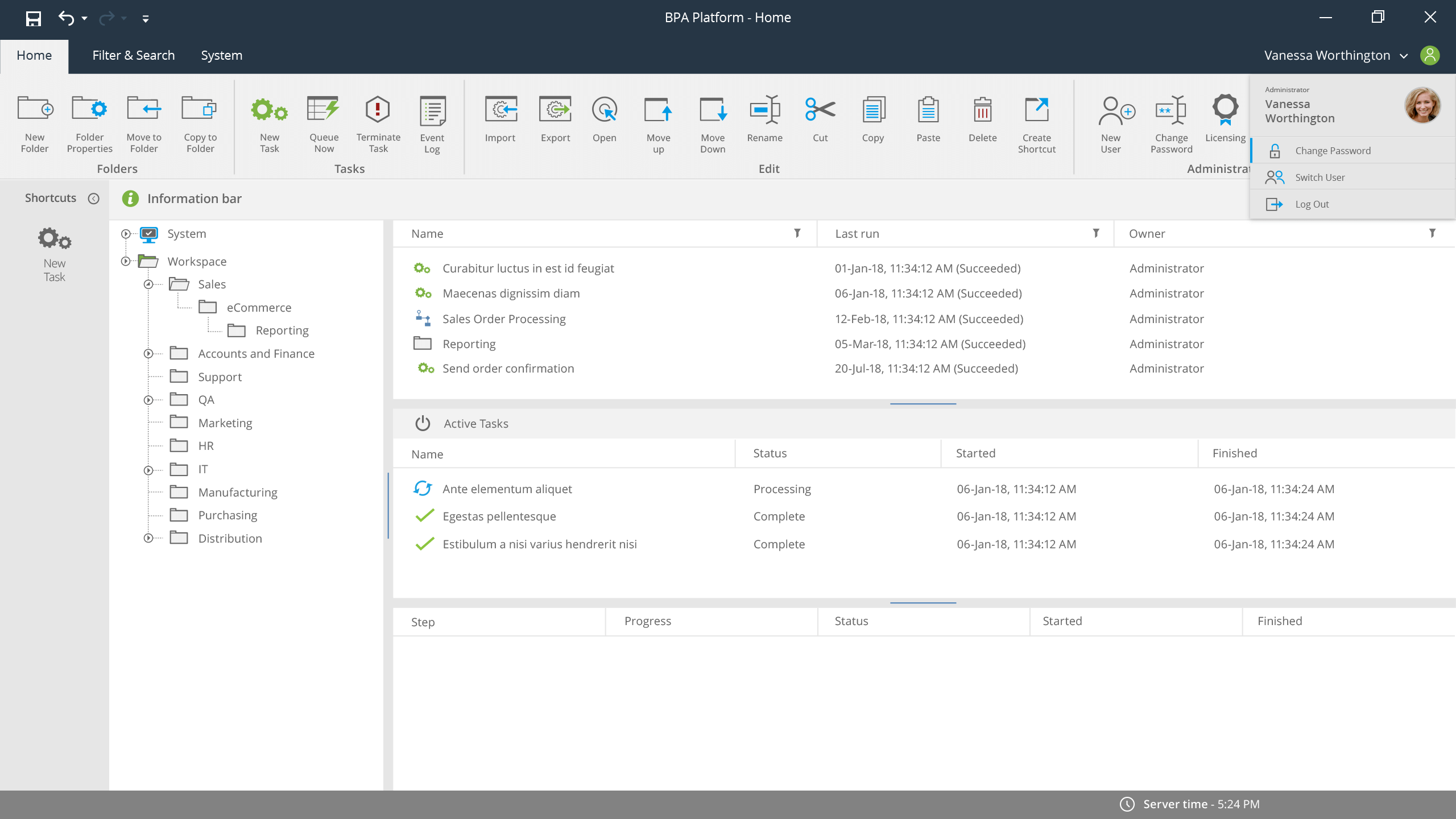
Image: Magento Order Management Example: Sales Order Being Processed
Specialist Magento integration tools, such as Codeless Platforms’ BPA Platform, provide a dedicated Magento connector that simplifies access to the Magento REST API. Once installed, additional integrations can be added. This can be achieved through either templated solutions that require minimal configuration or by utilising the power of its drag and drop tools to interact with data sources via ODBC, OLEDB, web services or an extensive range of supported third-party APIs through connectors.
Its ability to integrate with a variety of ERP systems and practically any data source to automate business processes through a drag and drop graphical user interface provides a significant reduction in software development times and costs.
Its Magento ERP integration tools provide a building platform of integration templates that can be quickly and easily configured to both ERP and Magento end points. Once configured, tasks and processes can be easily adapted and customised with data transformation and database triggers to automate a specific eCommerce process unique to your organisation, as and when business needs change.
Download Magento Integration Brochure
What is Magento Integration?
Magento integration enables businesses to automate the order management process without employee intervention. It helps to improve the speed of order processing and delivery, as well as reduces operational and fulfilment costs. Magento integration synchronises data between your Magento store and other business systems, such as ERP, CRM, WMS, procurement software, product information systems and courier services.
The most common Magento automation scenarios requested by organisations looking to streamline their eCommerce process include:
Automatically manage customer accounts: Automatically create and update customer accounts (details, billing/shipping address) in an ERP system from sales orders received through Magento. This includes new accounts, guest accounts and existing customer accounts.
Automate Magento order management and processing: Once a customer has checked out with a valid payment transaction, automatically download orders and include key information, such as product description, product code and quantity required, customer billing / shipping details, delivery method (including carriage charges) and method of payment.
Automatic sales order status updates: Automatically create and send order status updates from an ERP system to a Magento eCommerce platform.
Automatically create AR invoices and payments.
Automated inventory updates: When changes in inventory are identified in an ERP system, inventory levels will automatically be updated on the Magento store every 15 minutes.
Automatic Magento pricing updates: Automate the update of retail price changes in Magento on a scheduled basis.
Automatic product updates: Product synchronisation will be performed daily out of normal working hours to make sure all product details are up to date in Magento and any new products are uploaded when added to an ERP systems item master catalogue. When a product is unavailable it will be obscured on the web shop. Product SKU*, description, tax class, weight, retail price and on hand inventory quantity are uploaded.
As a top-level eCommerce integration, the above automated processes can be adjusted to suit exact business requirements. Additional integrations and automated processes can be added, such as courier service automation, automated pick lists, dispatch note creation, automated bank reconciliation, purchase order automation and shipping notifications.
Download Magento Integration Brochure
How much is Magento ERP integration?
Magento integration with ERP starts from £300 per month, depending on integration complexity and configuration days required.
The benefits of Magento ERP integration
A manual eCommerce process takes time, is prone to errors and can slowly eat away at the profitability of increasing sales numbers. Magento integration with ERP alleviates the processing pains by automating manual, bi-directional tasks between systems. Removing the manual interaction from employees processing data will streamline the Magento order management process, improve business efficiency and enhance customer satisfaction.
Common commercial benefits that organisations of all sizes can achieve through integrating ERP with Magento include:
- Streamlined Magento order management processes and removal of data entry errors
- Quickly and easily adapt business processes to meet strategic goals
- Reduced order to shipping/fulfilment times and costs
- Significantly reduced operational costs
- Reduction in the need to recruit additional resource during peak and seasonal periods
- Improved product catalogue consistency
- Improved customer satisfaction
Magento Integration Services
Codeless Platforms specialises in eCommerce ERP integration and provides cost-effective and market leading Magento integration services through its drag and drop business process automation and system integration solution, BPA Platform. For more information on how you can integrate Magento with your ERP system and other on-premises or cloud-based business applications, download the brochure below, or call us on +44 (0) 330 99 88 700.
